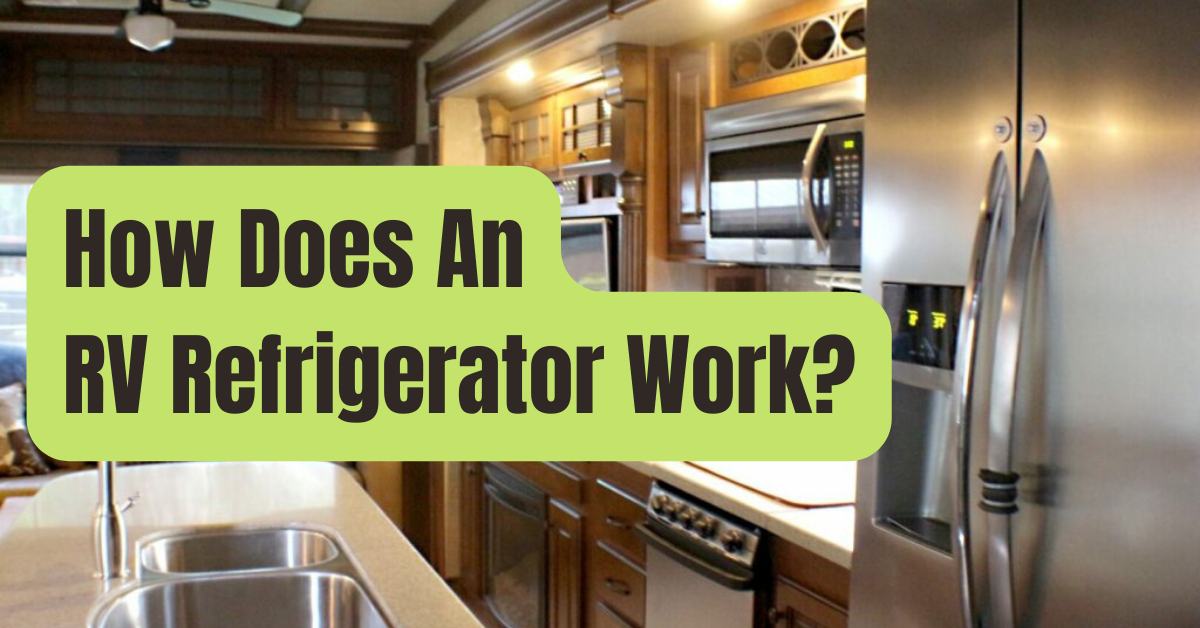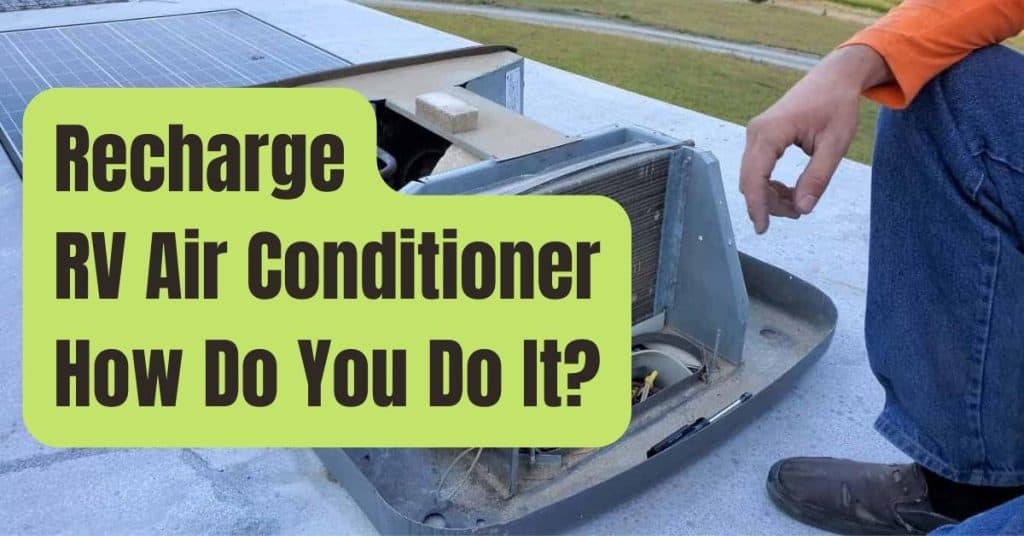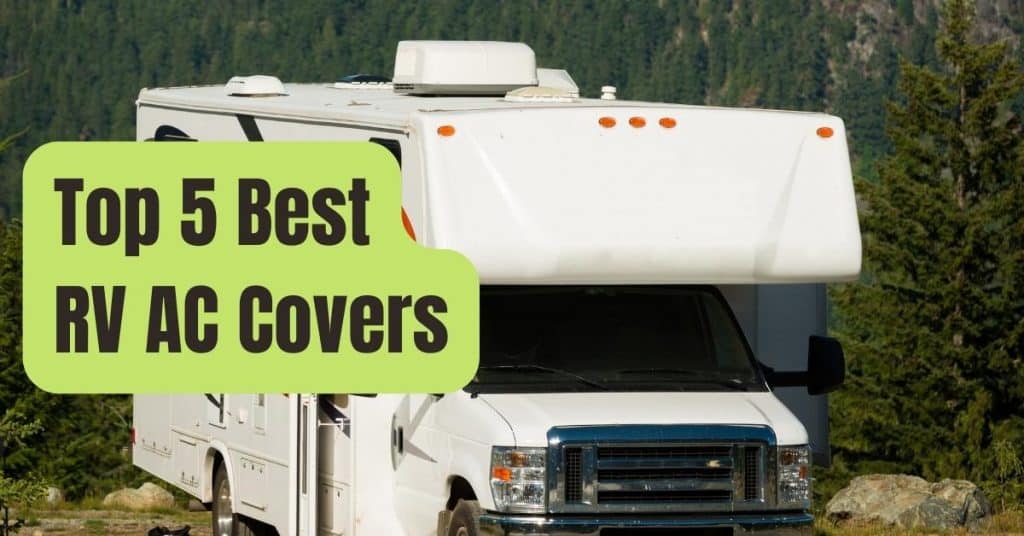Nothing matches the ease of having a fully stocked fridge for the trip when you’re going on a lengthy road trip.
But how exactly does a refrigerator in an RV operate? How do you ensure that it continues to operate for many years to come? Find out by reading on!
The Easy Solution for How an RV Refrigerator Operates
Just like your refrigerator at home, an RV fridge cools your food to a safe temperature for storage.
It often has a reduced size to fit in the RV’s space and a few unique characteristics, such as latching doors and the capacity to use various power sources.
The RV refrigerator is what is referred to as a heat pump since it transfers heat from inside to outside much as your refrigerator at home does.
However, since these freezers are vented, “outside” in the context of an RV might actually mean outside the RV.
They also maintain food’s temperature when moving and while it’s stationary.
The Difficult Answer to How an RV Refrigerator Operates
In RVs, there are primarily two kinds of refrigerators.
The variations may affect the capacity, cooling ability, and effectiveness of your refrigerator.
#1. Compact Fridge
In this variation, a tiny compressor unit is used to provide cooling for the RV refrigerator.
These refrigerators can run on either 110- or 12-volt electricity (or 230-volt if not in North America).
Users of this fridge will be most comfortable since it is the same kind that is often used in households.
Although less prevalent, DC solutions that can operate from the batteries of the RV are gaining popularity.
These devices use a very little amount of electricity and are very efficient.
The disadvantage is that they are usually more costly to buy upfront.
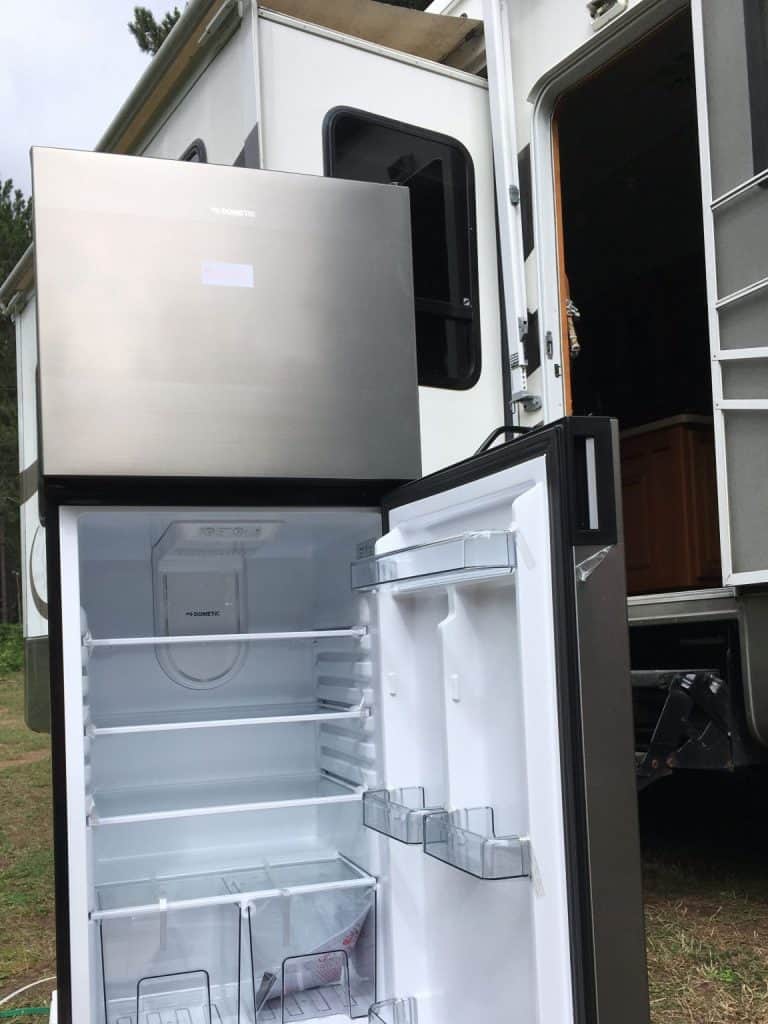
In comparison to absorption refrigerators (which we’ll discuss next), compressor refrigerators are better since they can typically maintain cooler temperatures even when it’s hot outdoors.
Although it’s a typical criticism that RV refrigerators can’t keep ice cream frozen solid, compressor refrigerators are your best option for really low temperatures.
The Cooling of Compressors
Refrigerators with a compressor rely on a closed-loop cooling system that uses the compressor to compress gas mechanically.
It is referred to as mechanical refrigeration as a result.
The cycle is composed mostly of three components.
- Compression: During this phase, the compressor raises the pressure of the refrigerant vapor. The refrigerant vapor’s temperature rises as a result of this high pressure.
- Condensation: The refrigerant enters the condenser while it is still hot and is cooled there. Similar to how water vapor condenses on a cold surface, the vapor condenses into a liquid throughout the cooling process.
- Evaporation: After being pushed through an expansion valve or a tiny hole, the high-pressure liquid refrigerant is subsequently pumped into a bigger tube. This reduces the liquid’s pressure until it reaches its boiling point. The refrigerator compartment loses heat because the refrigerant has a very low boiling point (-15 to -20F). The cycle then repeats again as the vapor travels back to the compressor.
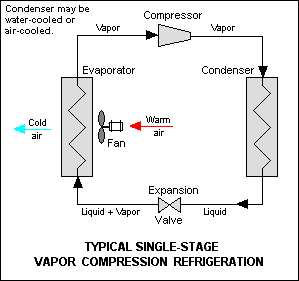
Although they also include a compressor, domestic refrigerators can only operate when hooked into a wall.
As opposed to an RV DC-based fridge, this restricts your possibilities.
A domestic 120-volt fridge requires more energy to maintain its cooling than a typical RV choice.
Although a 120-volt solution can be less expensive initially, the hassle and energy costs over time might not outweigh the short-term savings.
#2. RV Absorption Fridge
Since they may be powered by either electricity or propane, this is the kind of fridge that is used in RVs the most often.
They are frequently referred to as “2 way” or “3 way” RV fridges (propane, 110-volt electric, and 12-volt electric) refrigerators (propane and 110-volt electric).
There will always be vents on the exterior of the RV where the fridge is housed, thus you can always determine whether an RV has this sort of fridge.
When the refrigerator is powered by propane, the vents are necessary to release the heat and exhaust.
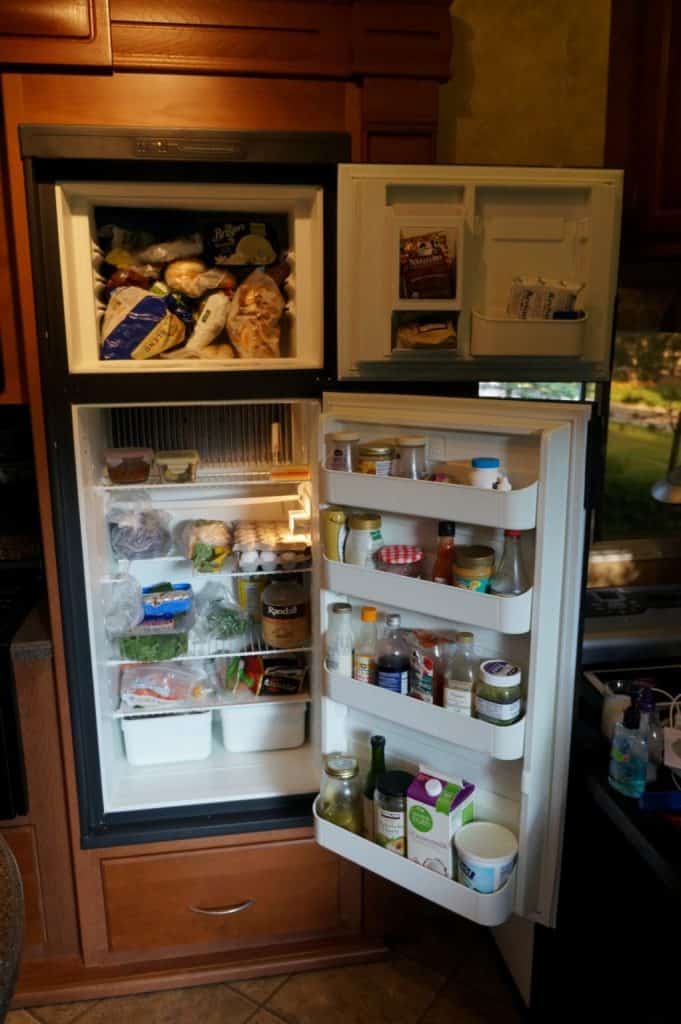
Contrary to popular belief, this sort of refrigerator cools itself by burning propane via a complex chemical process that takes place in a network of tubes at the rear.
The chemical reaction is driven by the heat from the propane.
The Chemical Process of Absorption
A mixture of heat and chemical processes involving water, ammonia, and hydrogen gas is used to operate an absorption RV refrigerator (sometimes helium).
Although the procedure is challenging, the refrigerator is confined in an enclosed system much like the compressor.
The cycle has three main segments.
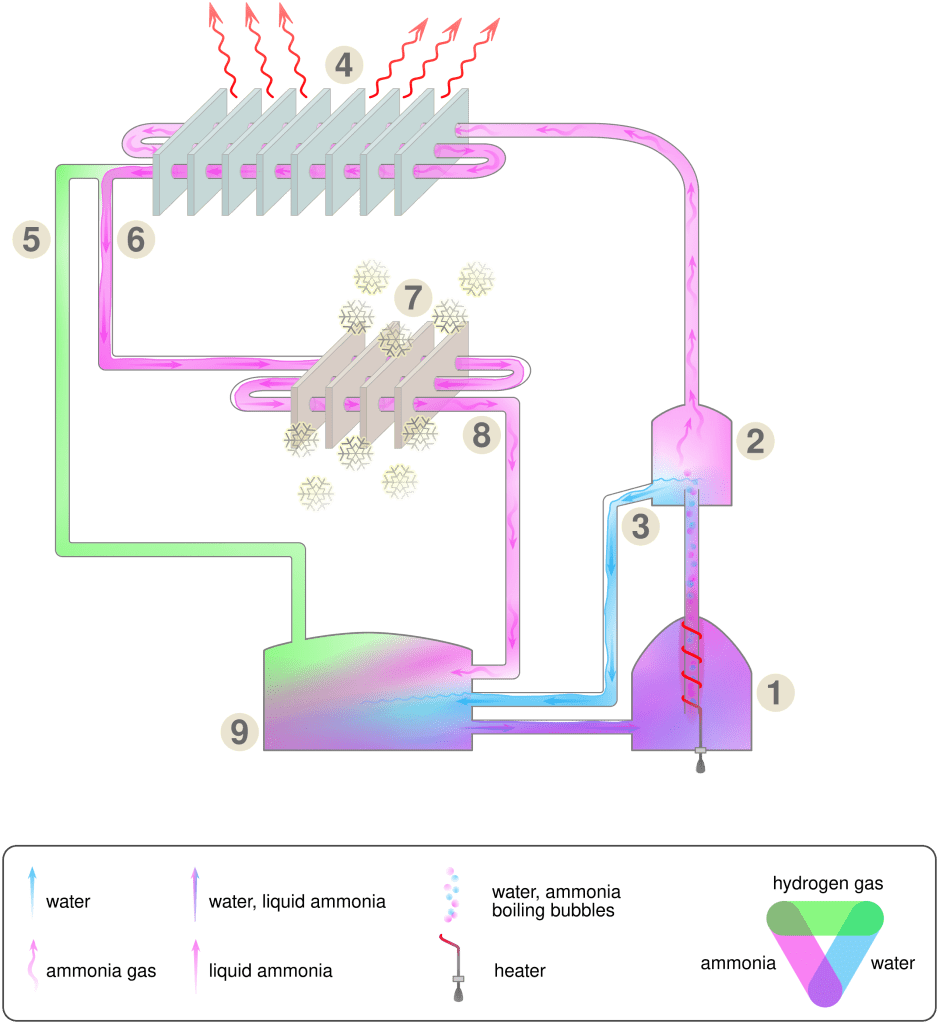
- Regeneration (Boiler): In this phase, the ammonia-containing refrigerant is combined with water and heated until it boils (heat is by propane or electricity). Because the ammonia and water have different partial pressures, they separate. While the ammonia travels to the top of the refrigerator, the water condenses lower in the system. As it reacts with hydrogen there, it releases heat into the atmosphere and condenses into liquid ammonia.
- Evaporation: During this phase, liquid ammonia vaporizes in an atmosphere with a low partial pressure while absorbing heat from its surroundings. This takes place underneath the refrigerator’s fins and absorbs heat from the appliance.
- Absorption: After turning back into a gas once again, ammonia drops into a pool of liquid water ammonia solution where it mixes once more with water vapor. The process then restarts in the regeneration chamber, where this solution is prepared to be cooked.
When your RV fridge is operating, this procedure is repeated to maintain it functional and chilled.
This procedure has the advantage of being quiet since there are no moving components.
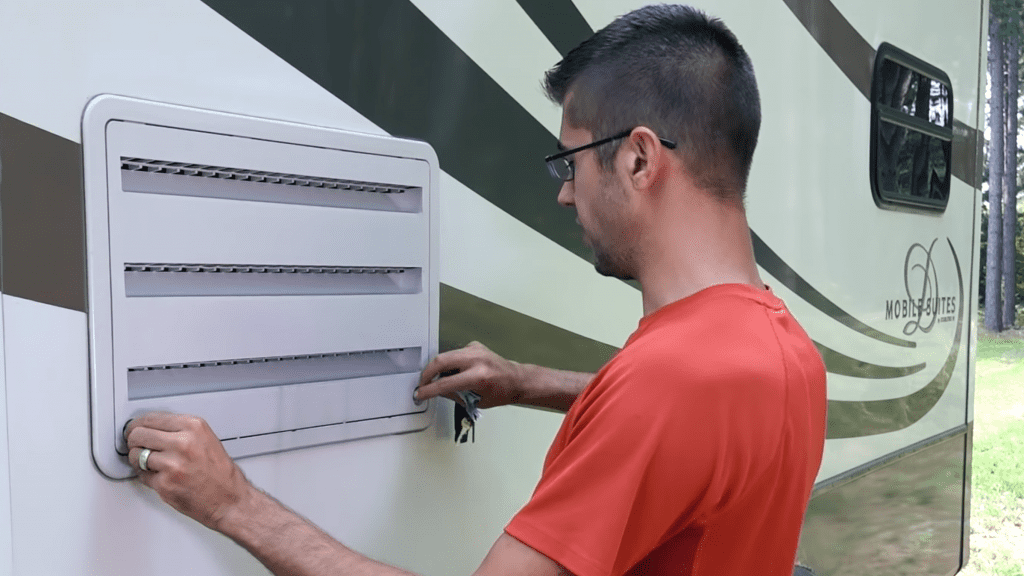
It takes more time to use this kind of cooling.
You should switch on your RV fridge at least 24 hours before you leave for a vacation so that it can cool down before storing food inside.
Comparison Of Refrigerators In Rvs And Homes
There is no difference between domestic fridges, which are found in certain RVs, and absorption-style fridges, which are found in most RVs and may be powered by DC electricity or propane.
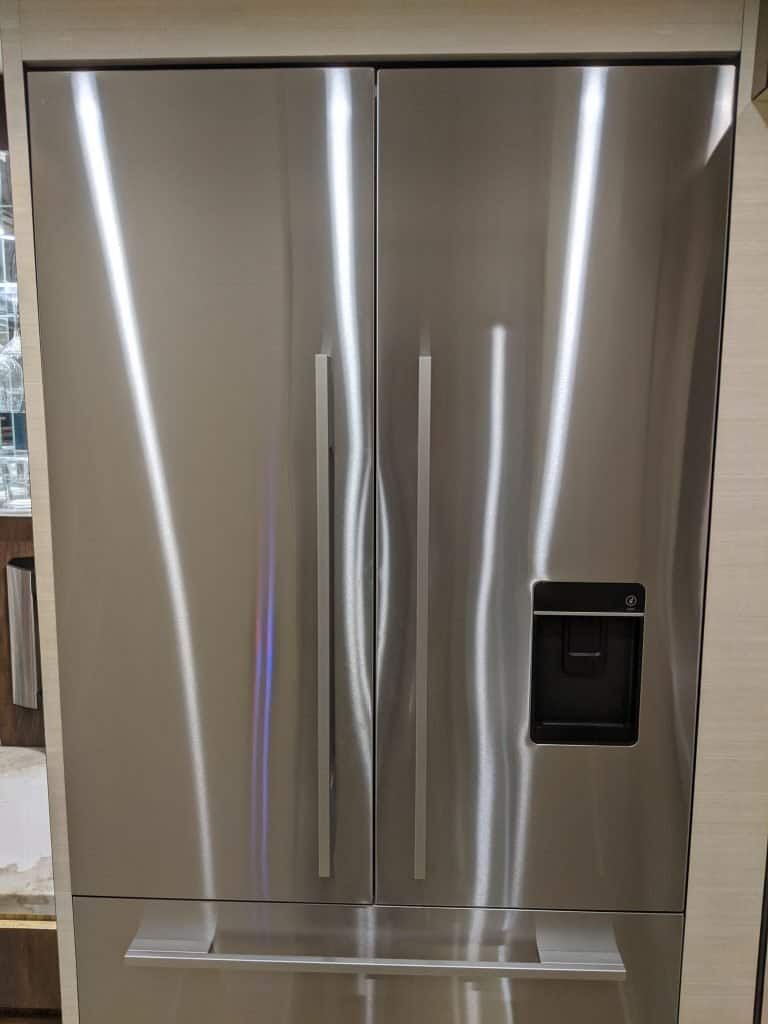
The dimensions and weight are yet another evident distinction.
In general, an RV refrigerator is substantially smaller than a refrigerator in a home.
Newer RV models, however, are pushing the envelope and including bigger and bigger fridges.
They also include elements such as ledges on the shelves and locks to prevent the doors from flying open into the design of RV refrigerators to endure road jolts.
Various RV Refrigerators
Here are some choices if your RV doesn’t have a fridge (or a functional fridge) or if you just need extra storage space for your next trip.
#1. Mini-Fridge
A little mini-fridge is an easy addition to an RV.
When you arrive at your campground, all you have to do is plug it in.
You may also operate the fridge while traveling if you have solar electricity.
Although a mini-fridge requires more room in your vehicle, it is inexpensive, comes in a range of sizes, and requires no installation.
To avoid any catastrophes, make sure you store it someplace secure when traveling.
#2. Cooler or Portable Fridge
A portable fridge/cooler is another option for adding more chilling area.
You might follow the conventional path and add ice to a cooler, but even the greatest coolers experience ice melt, which quickly results in your food sitting in a pool of water.
You won’t have to worry about it if you choose a portable fridge or electric cooler, however.
Some even provide a freezer as an option.
When it comes to their power supply, these devices are likewise incredibly adaptable.
For instance, Dometic CFX coolers contain cutting-edge compressor electronics that let them to run on as little as 100-240V AC, 12/24 V DC, or solar power! Even better, you can digitally regulate the temperature to maintain the ideal cool all day.
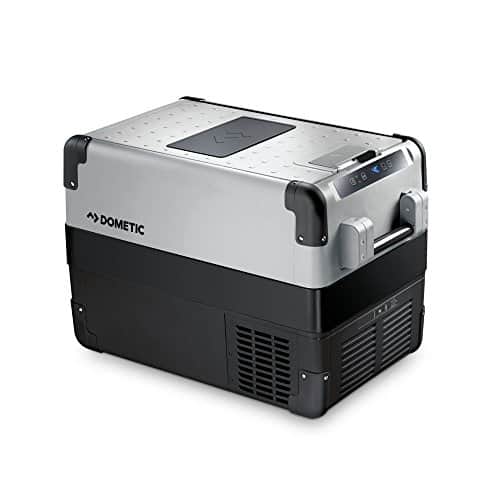
Dometic CFX 40W 12v Electric Powered Portable…
- Your purchase includes one cooler, one manual, one warranty card,…
- Portable Cooler dimensions: 15.6” W x 18.1” H x 27.2” D |…
- Additional features: USB Port – 5V, 500mA | Wi-Fi connectivity…
#3. Refrigerator in the Home
Some individuals choose to replace the refrigerator in their RV with a residential-style refrigerator.
To handle the higher size and weight, this upgrade requires some adjustment.
However, after it’s finished, you’ll be able to take use of the luxury for many years.
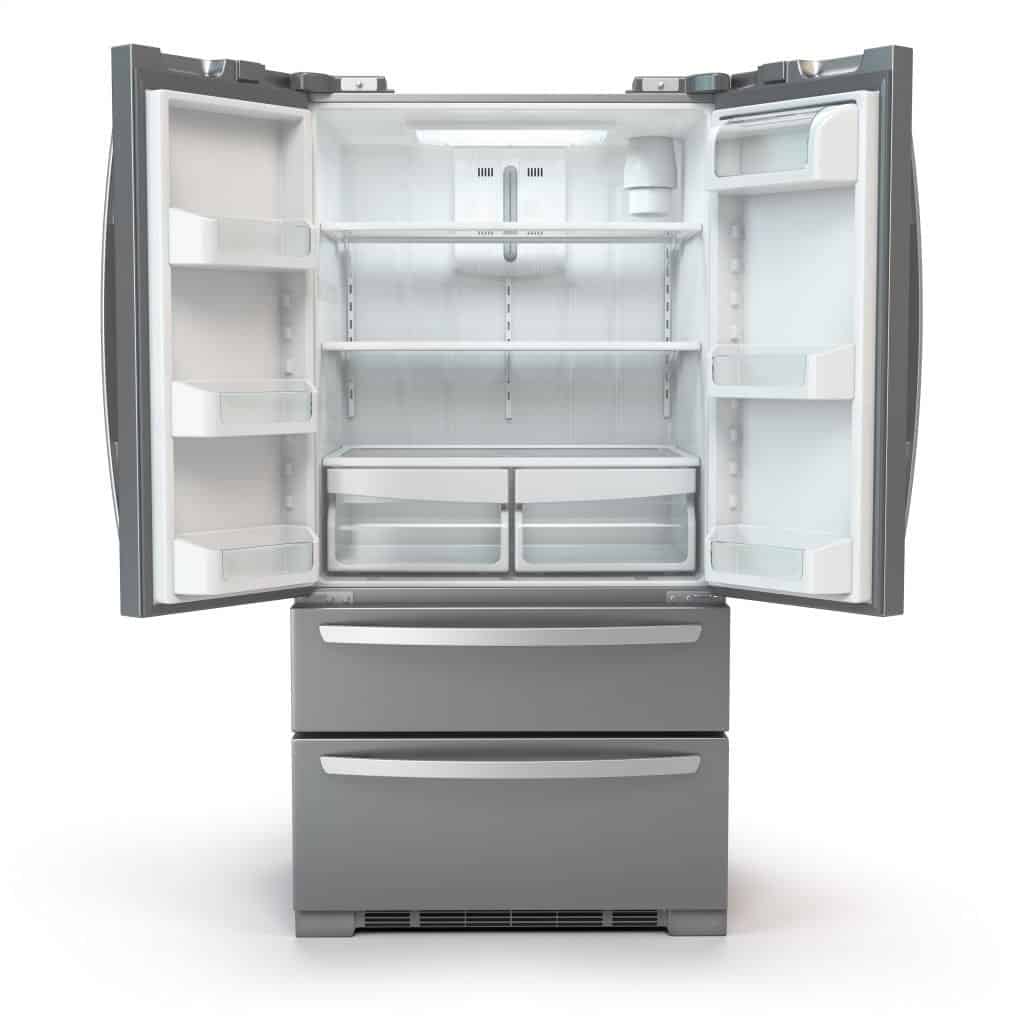
What Refrigerator Is Best for Your RV?
Knowing how an RV refrigerator works is crucial, but you also need to determine whether it will work for YOU.
There are a few things you should consider when purchasing a new RV refrigerator.
How cold should you keep your meals at all times? Do you want a refrigerator and freezer area? Will you be making frequent travels or living in the RV full-time? If that’s the case, a bigger fridge might be useful if your setup permits it.
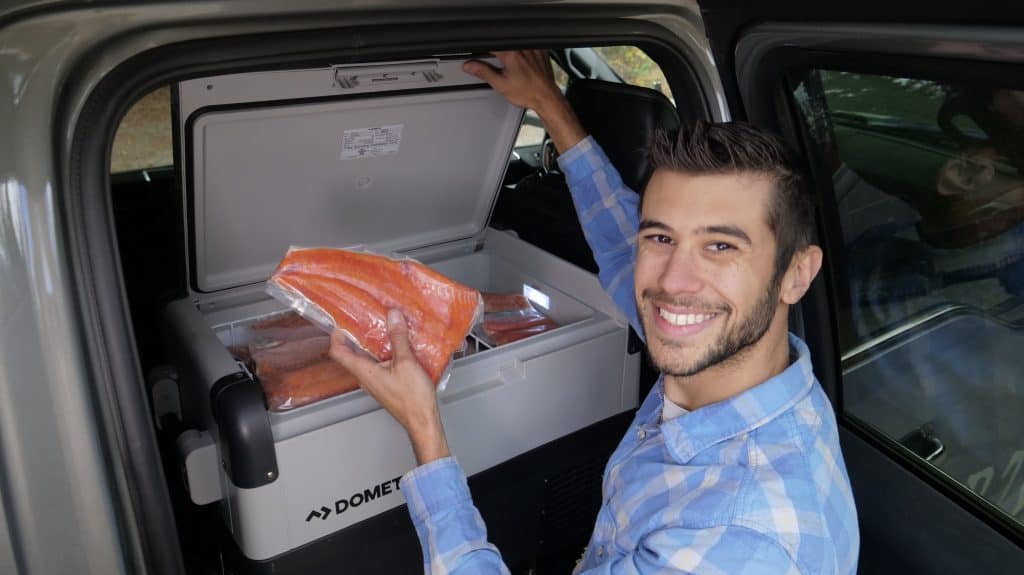
Consider the size of your family as well.
Food will be consumed rapidly if you are traveling with a big family.
This implies that if you have a tiny fridge, you will need to constantly replenish.
A refrigerator that can operate on propane can save you a ton of electricity if boondocking is your thing.
If you have adequate solar power installed, a 12-volt DC refrigerator is often a terrific choice.
The longer you can live off the grid, the more electricity you can save.
Cons and Benefits
Let’s examine the advantages and disadvantages of the various RV refrigerator kinds in more detail.
#1. Absorption RV Fridge
Pros
- Silent is the absorption kind of RV refrigerator.
- It consumes extremely little electricity while operating on propane.
- Because it can run on either propane or electricity, it’s perfect for boondocking.
Cons
Absorption refrigerators are pricey and very inefficient when powered by electricity.
They have a lower food storage capacity, do not chill as effectively as compressor models, and take 12 to 24 hours to become cold.
The exposed flame at the rear of absorption types makes them more prone to changes in external temperature and may cause fires.
#2. 12-Volt Compressor RV Fridge
Pros
The 12-volt compressor RV fridge uses energy extremely effectively and often may be powered by solar.
It may soon cool down and become quite frigid.
Additionally, there is additional room for food storage.
Cons
Refrigerators with a 12-volt compressor are pricey.
While operating, they do generate some noise, and a power source is always needed.
#3. 120-Volt Compressor Fridge (Residential Fridge)
Pros
When compared to the other refrigerators, this one boasts the strongest and fastest cooling capabilities.
Residential fridges are often full-sized and less costly than RV fridges, allowing you greater food storage space.
Cons
Residential refrigerators are not intended for use in RVs and do generate some noise.
This indicates that the shelves and doors lack latching systems to keep them closed while driving.
It also requires 120-volt electricity, thus while off the grid, an inverter is required, which significantly reduces its battery power efficiency.
Conversion from Absorption to Compressor
As a result, you may have observed that the DC compressor fridge is a far superior choice in terms of cooling ability and power efficiency.
It is possible to switch an absorption-style refrigerator to a DC compressor type while maintaining the same form factor and improving cooling and electricity efficiency.
We produced a movie explaining what we did to our refrigerator after doing it.
JC Refrigeration, an Amish-owned business located close to Elkhart, Indiana, produced the compressor cooling unit.
Typical Refrigerator Lifespan in an RV
If properly cared for, a conventional RV refrigerator may survive for at least 15 years.
Some, if you’re fortunate or make little repairs along the way, may endure up to 20 years.
This is advantageous since it might be expensive to replace them!
Tips for Use and Maintenance
Here are some simple guidelines to help your RV refrigerator run more effectively for longer:
- The performance of your refrigerator will be improved if your RV is level. For refrigerators that use absorption, this is particularly true. We advise turning off your RV fridge completely rather than running it on gas if you have a steep drive.
- Keep the sun’s rays away from your refrigerator.
- To boost efficiency and optimize airflow, install a fan in your RV refrigerator. In this post, we discuss The Truth Showing RV Refrigerator Fans and give a video about how we installed a fin fan and the kit we purchased.
- To prevent cold air from leaking out of the door, replace the gasket seal.
- Defrost the refrigerator as necessary to melt the ice on your fins.
- To make the most of its capacity and space, defrost your RV freezer.

RV Fridges with Absorption: Safety Alert
When using propane, absorption RV refrigerators have a flame in the rear of them.
Fire danger exists as a result of this.
The burner of the refrigerator may catch fire if birds, insects, or other material enter the vent and accumulate there.
Although it’s one of the most typical reasons for RV fires, this may be avoided.
Pro Tip: Condenser coil and propane components should be cleaned every few months, and the outside vent should be cleared of any accumulation or debris.
To avoid a potential fire, this is crucial.
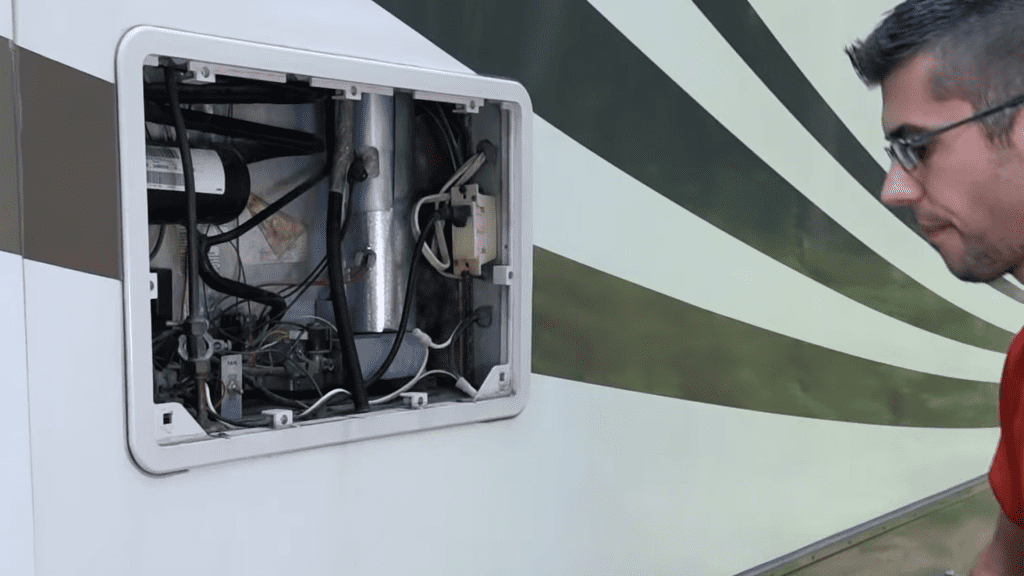
You may take precautions to ensure your RV refrigerator runs efficiently for many years now that you understand how it functions.
Additionally, you now have alternatives for additional space and usefulness if your present setup’s size or functionality isn’t cutting it.

